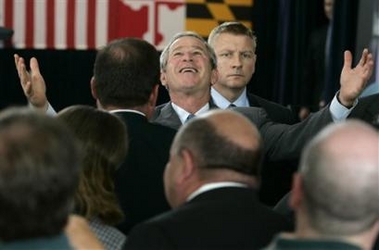Category / Arrogance
The Politics of Boasting
We don’t often look to electoral politics for sublime life lessons, yet sometimes the lessons are there. Rudy Giuliani and Mitt Romney, two popular Republican politicians, have dropped out of the 2008 presidential race. Both candidates exemplified an attitude that has been with us forever but seems to have a peculiar hold on our own time: the attitude of arrogance, or vain overconfidence. Perhaps voters wished to punish this attitude by refusing to vote for either man.
 Rudy Giuliani’s smug self-assurance had been legendary during his long career as District Attorney and Mayor in New York City. But he revealed a more off-putting overconfidence to voters with his strange decision to not compete in the earliest GOP Primaries. He calmly assured his followers that he would sweep up victory in Florida, incorrectly guessing that no other candidate would excite voters in the prior contests. This was a bad strategy in several ways, but it may have backfired for one particular reason above all: it reminded voters of George W. Bush and Donald Rumsfeld’s flippant assurances that they would easily sweep up victory in Afghanistan and Iraq. In 2008, overconfident leadership is the polar opposite of what Americans want.
Rudy Giuliani’s smug self-assurance had been legendary during his long career as District Attorney and Mayor in New York City. But he revealed a more off-putting overconfidence to voters with his strange decision to not compete in the earliest GOP Primaries. He calmly assured his followers that he would sweep up victory in Florida, incorrectly guessing that no other candidate would excite voters in the prior contests. This was a bad strategy in several ways, but it may have backfired for one particular reason above all: it reminded voters of George W. Bush and Donald Rumsfeld’s flippant assurances that they would easily sweep up victory in Afghanistan and Iraq. In 2008, overconfident leadership is the polar opposite of what Americans want.
Mitt Romney’s arrogance — a relaxed square-jawed perfection excavated from an earlier age — has always been different from Giuliani’s. Unlike John McCain and Mike Huckabee, Romney rarely revealed any personal frailty or flaw, betrayed few complex emotions, and was never caught agonizing over a decision. In other eras of American politics, this politician might have been highly valued for his Teflon sheen, but again in 2008 we’ve had enough of slick impenetrability. After eight years of “stuff happens” (from Katrina to Pakistan, and stuff is still happening), American voters may need a long recovery period before we’ll vote for a politician with a self-assured, unflappable personality again.
Maybe this is why Hillary Clinton’s biggest rebound moment occurred after she teared up before a TV audience, or why the naturally intense and earnest Barack Obama is catching on with voters. But arrogance hasn’t always been a detriment for a politician. When George W. Bush first emerged as a Presidential candidate a decade ago, his cool arrogance was considered his best feature. It made him “Reaganesque.” Ronald Reagan’s easygoing charm was always rooted in a stern and unshakable confidence that people yearned to find again, and this was no small factor in the emergence of another ex-President’s wayward Texan son as a conservative politician. When the younger George W. Bush’s advisors, pollsters, and image makers assembled him in the laboratory, they marveled at the creature’s unflappable self-certainty.
 George W. Bush was constantly referred to as “Reaganesque” in his earlier years, though this image seems so far away now that we easily forget it. It turned out that President George W. Bush did not have the leadership skills of President Ronald Reagan. Just the arrogance.
George W. Bush was constantly referred to as “Reaganesque” in his earlier years, though this image seems so far away now that we easily forget it. It turned out that President George W. Bush did not have the leadership skills of President Ronald Reagan. Just the arrogance.
Of course, U.S. Presidents have been arrogant since the imperious George Washington, who demanded that his subjects kneel. There were perhaps none more blustery than the remarkable Theodore Roosevelt, whose effusive self-confidence is still fondly remembered today. Richard Nixon always presented a face of somber self-righteousness to the public, and a much deeper and insidious arrogance was revealed on the White House Tapes released during the Watergate affair. Jimmy Carter’s inability to rally his government behind his leadership appears to have been rooted in a principled rigidity. It’s probably the case that more US Presidents have been deeply arrogant than not.
It’s a more troubling fact that the United States of America is constantly described as an arrogant nation by many who criticize it, from Noam Chomsky books to Al Qaeda videos to countless casual conversations among concerned citizens. This, again, is nothing new. It was our arrogant Pacific Rim policy that frustrated Japan into attacking Pearl Harbor in 1941, for instance. So, is the United States of America actually arrogant? And what exactly does it mean to say this?
ar • ro • gance: (noun) offensive display of superiority or self-importance; overbearing pride.
Whether this shoe fits or not cannot be easily decided, but it does seem easy to understand how various American policies in Asia, the Middle East, Central America, South America, Africa and Europe can be seen as arrogant. Other world powers like Russia, England, China, France and Germany carry on similar legacies, and more generally it’s clear that a natural belief in the superiority of one’s nation, one’s religion, one’s ethnic group, one’s class, or one’s gender is universal in every society on Earth. It’s hard to imagine any influential nation of any size that has not acted arrogantly towards its neighbors.
Arrogance is as common as the air we breathe. You can’t walk down the street without slamming into it, usually coming at you from several directions at once.
It’s a strange fact that arrogance is not one of the seven deadly sins, while pride is. Dictionary.com defines pride as something much more positive than arrogance:
pride (noun): A sense of one’s own proper dignity or value; self-respect.
So how can pride be a sin if arrogance is not? The seven deadly sins were developed by a number of early Christian writers. One version was endorsed (and thus codified) by Pope Gregory I in the sixth century. I wonder if this pope might have chosen pride over arrogance as one of the seven deadly sins because pride denotes a certain secretive self-regard, while arrogance does not. Pride is a private feeling, whereas arrogance is essentially public and relational. You can only be arrogant in relation to others, and by being arrogant you are being honest about your true feelings. Several of the deadly sins revolve around secrecy, but arrogance is an honest expression of what you believe.
In 2008, the United States of America seems to be reeling from a trauma of arrogant and incompetent leadership, and there’s no telling what ripple effects this trauma may eventually cause. But even if American voters are turning towards more down-to-earth candidates in 2008, it’s hard to imagine that human nature is being fundamentally changed. We were designed to be arrogant, and to admire arrogance in others. We can’t defeat arrogance and we can’t erase it; perhaps all we need to do is avoid being blinded by it in the future and we’ll be okay.